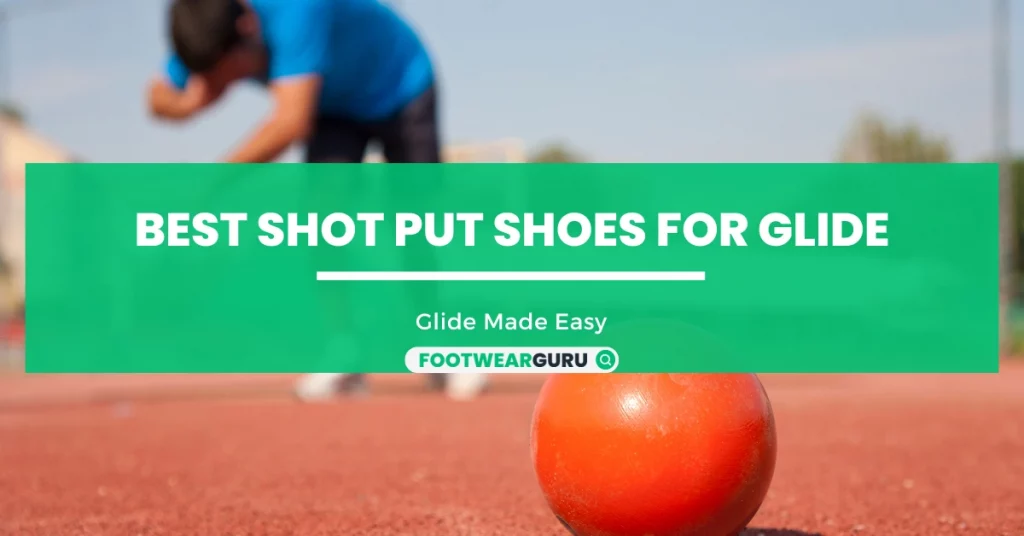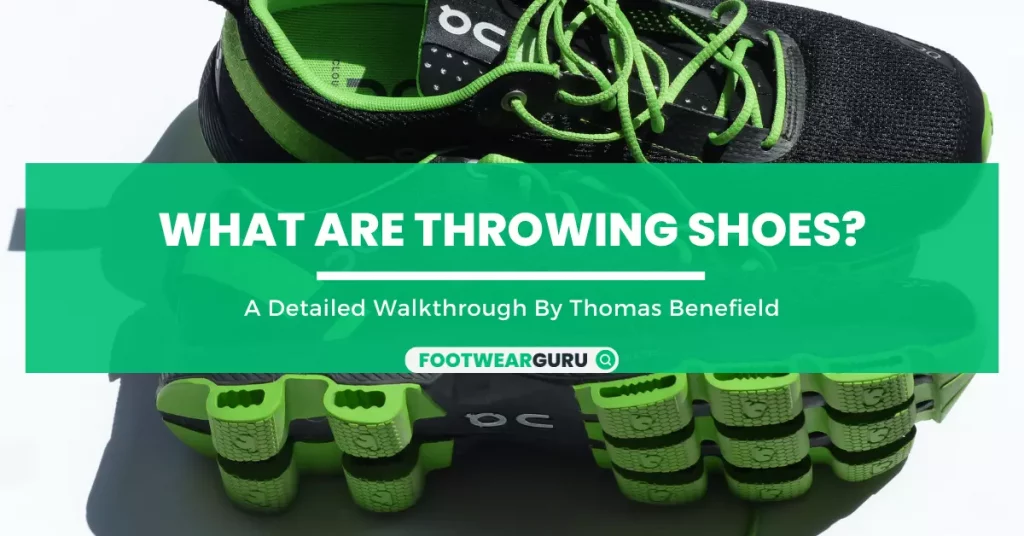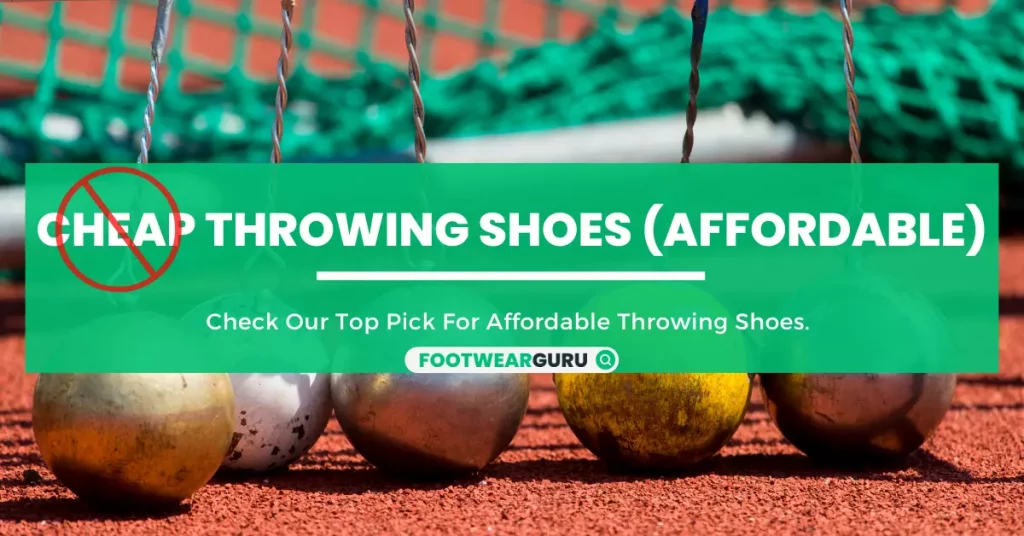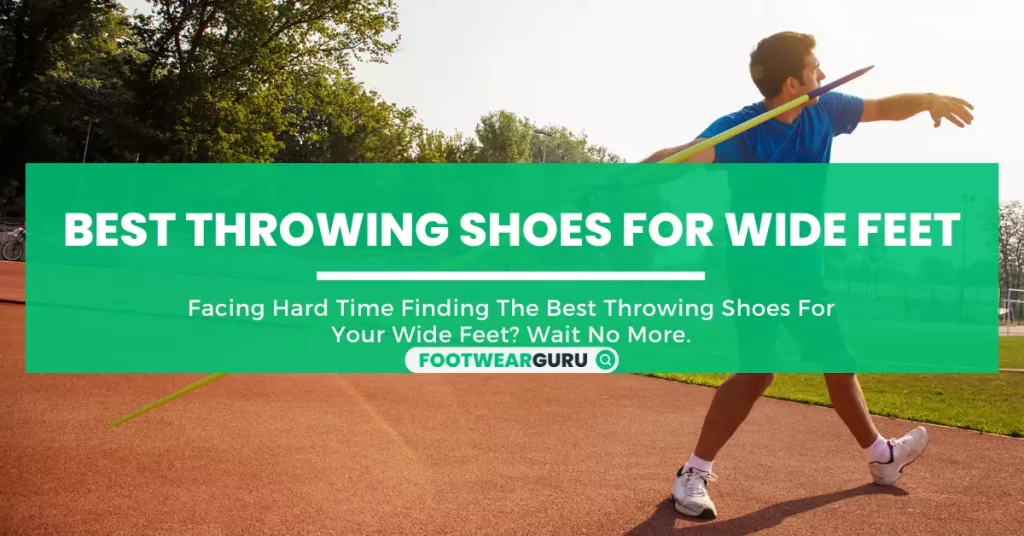Shoes for throwing are a surprisingly big deal in the sport, and a lot of people are wondering about how they should fit. Throwing shoes are, in many ways, like regular shoes, and in some ways, they differ quite a lot.
Here we’ll go over the different types of throwing shoes and what features they have. The most important thing to remember is that you need to be comfortable and that you feel safe while wearing them. This is because shoes that don’t fit well can easily slip off, and that can lead to an injury.
The type of shoe you need depends on your personal preference and what you plan on doing with it. Thanks to the rising popularity of the sport, you can find quite a few different options available.
Key Takeaways:
If you want to know how your throwing shoes should fit, you have come to the right place. But before you jump into the answer, you should know that there are two types of fitting. Here are they:
- Glove Like Fit.
- Slipper Like Fit.
To be a professional thrower, you should go with the Glove Like Fit. Because there is so much twisting and turning involved in throwing events, you don’t want so many rooms on your toes. So if you want the best performance from your throwing shoes, you should want a glove-like fit.
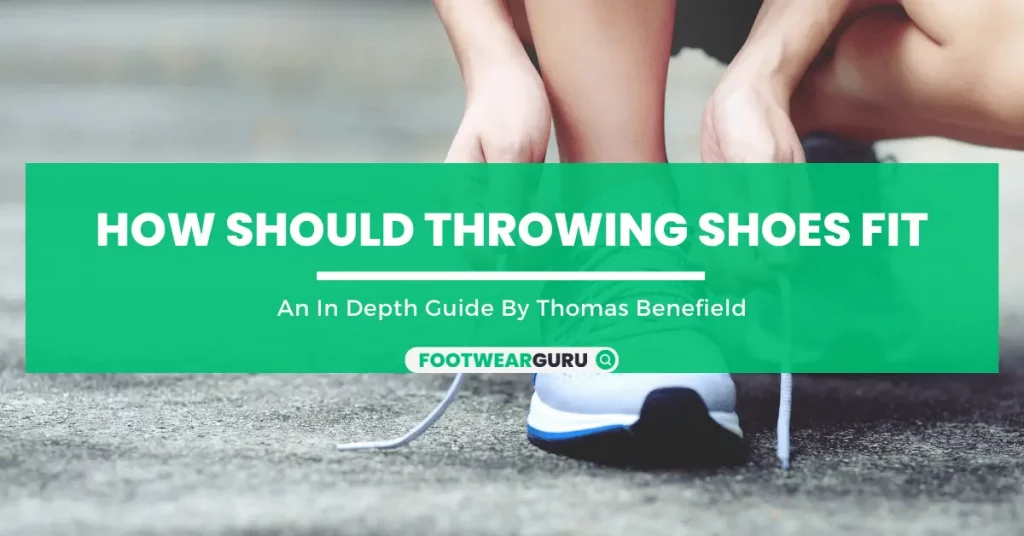
Throwing Shoes: Types &Features
The type of shoes used to throw depends on the event. For each type of throwing event, athletes use a different type of throwing shoe. Currently there are four types of throwing events that are very popular:
- Javelin throw.
- Shot put.
- Discus throw
- Hammer throw.
Javelin Throwing Shoes
Spikes are one of the most important features of Javelin Throwing Shoes. Normally in this event, you have to run a lot and then throw, so in this instance, there is a chance of slipping due to the rubber sole. For this reason, Javelin Throwing Shoes have spikes for better grip. Because of the pins, the shoes are easier to hold on to and grip than regular shoes, especially when the ground is wet.
Features: People often call them javelin boots because they are bigger, heavier, and provide more support (especially around the ankle). There are low-top, mid-top, and high-top versions. Unlike other throwing shoes, this one has spikes.
The Saucony Men’s Lanzar JAV2 Track and Field Shoe is one of the most recommended options for a new javelin thrower. In case you are concerned about how these throwing shoes should fit, scroll a little bit down and you’ll find out.
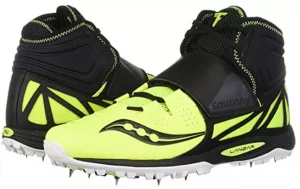
Shot Put/ Discus Throw/ Hammer Throw Shoes
Many athletes who throw the hammer, discus, and shot put can use the same shoe for all three events. This saves money over time and keeps you from having to change your shoes between events. We would suggest having more than one pair of throwing shoes so you can switch between them when training and competing.
Features: The shoes for the shot put, the discus, and the hammer are different from the other track shoes. There’s no spike plate on the shoes, and they fit tighter. To ensure a better grip when using the glide technique, shoes should have a textured rubber outsole instead of a smooth bottom.
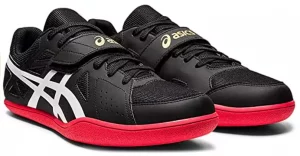
The Fit You Get On Throwing Shoes
There are two categories of throwing shoes fit-
- Glove Like.
- Slipper Like.
Glove Like Fit:
The shoe fits like a glove, which means there is no wiggle room in any part of it. It’s very snug everywhere. There is no slip edge. Many experts believe that athletes benefit from a glove-like fit, especially throwers. If you want a glove-like fit, order a half size down from your normal size.
Slipper Like Fit:
Slipper-like is the second category that determines how your throwing shoes should fit. Slipper-like means you can wiggle your toes a little bit. It is still snug in the hill and the arch, but there is some room for your toes.
Which Fit is Best For Throwers & Why?
The original fit of shot put and discus shoes are glove-like. Because in the shot put and other throwing games, there are so many twisting and turning involved, that’s why you don’t want so many rooms on your toes. So if you want the best performance from your throwing shoes, then you should definitely want a glove-like fit.
Generally, most throwing shoes are unisex or men’s sizes, so women should buy a size and a half smaller than the normal size to ensure a proper fit.
How to Choose Your Throwing Shoes
Comfortable But Tight Fit
To improve performance and keep from getting hurt, you need a tight fit. The ideal is a snug fit around the foot that doesn’t hurt.
A Good Grip
A shoe with a good grip will help you keep your balance and make it less likely that you’ll slip during the throw. Again, good traction helps the thrower build up speed before the throw, which makes the throw better overall. Having shoes with good grip is also important for keeping from getting hurt.
Lockdown
Lockdown is important because it keeps the foot in place and pushed down into the platform.
A Smooth & Flat Shoe Bottom
As mentioned above, a shoe with a flat, smooth bottom makes it easier for the thrower to spin smoothly, which helps build up speed before the throw.
Strong Build
Most track and field shoes are much lighter than discus shoes. The goal of this design is to keep the thrower on the ground, especially when throwing. But you don’t want your shoe to be so heavy that it makes it hard to move your foot.
Other Things to Consider
You should also think about things like price, speed, and durability, in addition to the technical specs mentioned above. Furthermore, you need to be cautious when choosing shoes for throwing if your feet are wide.
How Should Throwing Shoes Fit – FAQs
The discus track and field shoes you wear should fit snug if you are a thrower. Since shot put and other throwing games involve so much twisting and turning, you don’t want so much room on your toes.
It depends on how you use them. The footwearguru suggests that you should replace your shoes every season, or every 3-4 months if you use them frequently.
Throwing shoes are obviously beneficial if you are a professional thrower. The excessive grip in other running shoes prevents you from rotating and moving, which is necessary for throwing. So, for a thrower, throwing shoes are helpful.
The shoes used by javelin throwers are different from those worn by regular throwers. Javelin throwing shoes have javelin spikes, which provide stability and a good grip. These spikes are the heaviest of all spikes on the market.
Final Words
Throwing shoes is very personal, especially if you’re throwing a lot. Finding the one shoe that you love, feel good in, and perform well is really important. You will be wearing this shoe all tournament. Make sure it’s a shoe that you feel good in. Hopefully, after reading this post, you will have a better understanding of how throwing shoes should fit.
